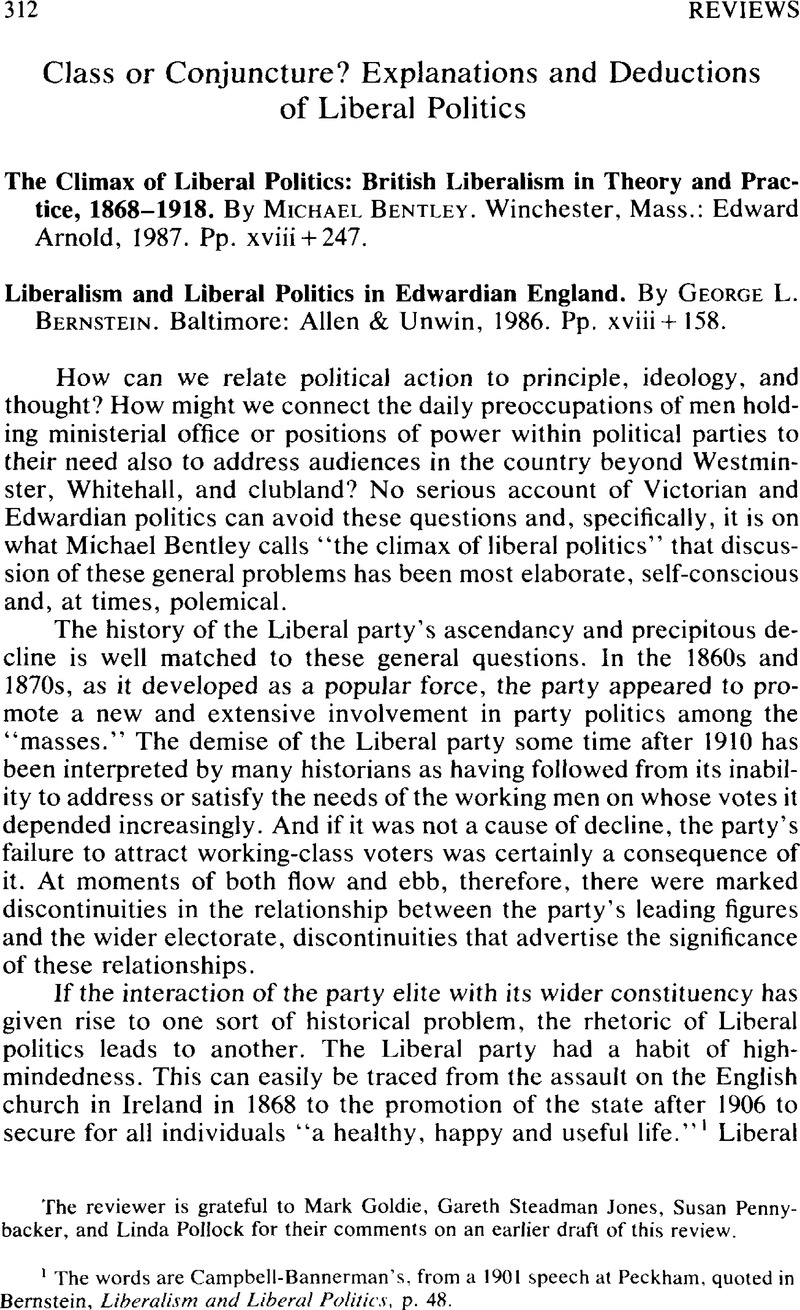No CrossRef data available.
Article contents
Class or Conjuncture? Explanations and Deductions of Liberal Politics - The Climax of Liberal Politics: British Liberalism in Theory and Practice, 1868–1918. By Michael Bentley. Winchester, Mass.: Edward Arnold, 1987. Pp. xviii + 247. - Liberalism and Liberal Politics in Edwardian England. By George L. Bernstein. Baltimore: Allen & Unwin, 1986. Pp. xviii + 158.
Published online by Cambridge University Press: 10 January 2014
Abstract

- Type
- Reviews
- Information
- Copyright
- Copyright © North American Conference of British Studies 1989
References
1 The words are Campbell-Bannerman's, from a 1901 speech al Peckham, quoted in Bernstein, , Liberalism and Liberal Politics, p. 48Google Scholar.
2 Vincent, J. and Cooke, A. B., The Governing Passion: Cabinet Government and Party Politics in Britain, 1885–1886 (Brighton, 1974), pp. 22, 161Google Scholar.
3 This point has been made by Bentley in an important essay, “Party, Doctrine and Thought,” in High and Low Politics in Modern Britain: Ten Studies, ed. Bentley, M. and Stevenson, J. (Oxford, 1983), pp. 123–53Google Scholar.
4 Apart from Vincent and Cooke, see, e.g., Cowling, M., 1867: Gladstone, Disraeli and Revolution (Cambridge, 1975)Google Scholar, The Impact of Labour, 1920–1924 (Cambridge, 1971)Google Scholar, The Impact of Hitler (Cambridge, 1975)Google Scholar; and Jones, A., The Politics of Reform, 1884 (Cambridge, 1971)Google Scholar.
5 Vincent and Cooke, p. 161.
6 For Vincent and Cooke's understanding of Gladstone's political goals in 1886, see ibid., pp. 55–56. Some useful comments bearing on the limitations of this sort of interpretation can be found in Skinner, Quentin, “The Principles and Practice of Opposition: The Case of Bolingbroke versus Walpole,” in Historical Perspectives: Studies in English Thought and Society in Honour of J. H. Plumb, ed. McKendrick, N. (London, 1974), pp. 93–127Google Scholar.
7 Cowling, 1867, pp. 311–12.
8 See Parry, J. P., Democracy and Religion: Gladstone and the Liberal Party, 1867–1875 (Cambridge, 1986), p. 3CrossRefGoogle Scholar.
9 Hilton, B., “Gladstone's Theological Politics,” in Stevenson, and Bentley, , eds., pp. 28–57Google Scholar.
10 Goldman, L., “The Social Science Association, 1857–1886: A Context for Mid-Victorian Liberalism,” English Historical Review 101 (1986): 95–134CrossRefGoogle Scholar.
11 Clarke, P. F., Lancashire and the New Liberalism (Cambridge, 1971)CrossRefGoogle Scholar.
12 For example, Hamer, D. A., Liberal Politics in the Age of Gladstone and Roseberry: A Study in Leadership and Policy (Oxford, 1972)Google Scholar.
13 Some recent essays questioning the emergency of a self-conscious working class in the late nineteenth and early twentieth centuries are McKibbin, R., “Why Was There No Marxism in Britain?” English Historical Review 99 (1984): 297–331CrossRefGoogle Scholar; Benson, J., “Work,” in The Working Class in England, 1875–1914, ed. Benson, J. (Beckenham, 1975), pp. 63–88Google Scholar; Reid, A., “The Division of Labour and Politics in Great Britain, 1880–1920,” in The Development of Trade Unionism in Great Britain and Germany, 1880–1914, ed. Mommsen, W. J. and Hsung, H. G. (London, 1985), pp. 150–66Google Scholar.
14 Clarke, P. F., “The Electoral Sociology of Modern Britain,” History 57 (1972): 51CrossRefGoogle Scholar.
15 Matthew, H. C. G., McKibbin, R. I., and Kay, J. A., “The Franchise Factor in the Rise of the Labour Party,” English Historical Review 91 (1976): 723–52CrossRefGoogle Scholar; McKibbin, R., The Evolution of the Labour Party, 1910–1924 (Oxford, 1974)Google Scholar; and Laybourn, K. and Reynolds, J, Liberalism and the Rise of Labour, 1890–1918 (London, 1984)Google Scholar.
16 Miller, W. L., Electoral Dynamics in Britain since 1918 (London, 1977), p. 153CrossRefGoogle Scholar.
17 A point made by Dunbabin, J. P. D. in “British Elections in the Nineteenth and Twentieth Centuries, A Regional Approach,” English Historical Review 95 (1980): 242Google Scholar. On working-class support for the Conservative party in the twentieth century, see McKenzie, R. and Silver, A., Angels in Marble: Working Class Conservatives in Urban England (London, 1968)Google Scholar.
18 Murray, B. K., The People's Budget, 1909–10: Lloyd-George and Liberal Politic (Oxford, 1980)Google Scholar.
19 McCallum, R. B. and Readman, A., TheBritish General Election of 1945 (London, 1947), pp. 259–62Google Scholar; Butler, D. E. and King, A., The British General Election of 1966 (London, 1966), pp. 264–65CrossRefGoogle Scholar.
20 Addison, P., The Road to 1945 (London, 1975)Google Scholar; Jeffrey, T., “The Suburban Nation: Politics and Class in Lewisham,” in Metropolis: London Histories and Representations since 1800, ed. Feldman, D. and Jones, G. Stedman (London, 1989)Google Scholar.
21 J. Gillespie, “Populism and Proletarianism: Unemployment and Labour Politics in London, 1918–1934,” in Feldman and Stedman Jones, eds.
22 See McKenzie and Sliver.




